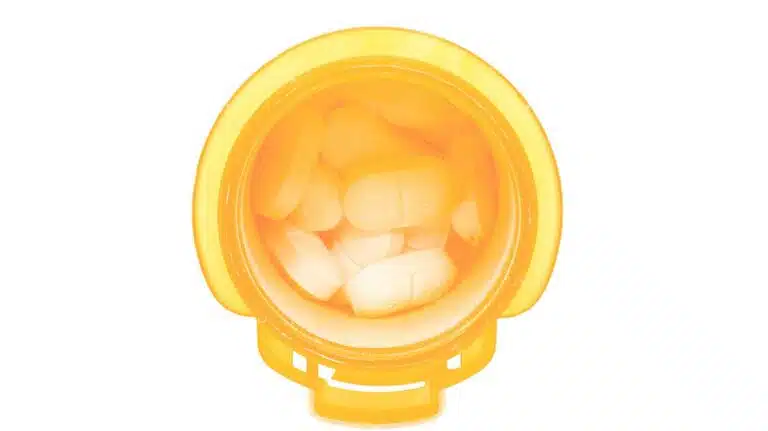Codeine Vs. Hydrocodone | Which Is More Addictive & Dangerous?

Hydrocodone and codeine are both prescription opioid medications used for pain relief.
Although these painkillers are Schedule II controlled substances according to the United States Drug Enforcement Administration (DEA), hydrocodone may be more dangerous than codeine due to the strength of the medication.
Hydrocodone is primarily used to help treat those suffering from severe pain while codeine is used to treat mild to moderate pain. Despite this, both pain medications have the potential for abuse and addiction.
Differences Between Hydrocodone & Codeine
Codeine and hydrocodone have numerous similarities yet significant differences. Hydrocodone is used to treat those in severe or chronic pain while codeine is used to treat mild pain or coughing.
Hydrocodone is available in combination with other products such as Vicodin (hydrocodone/acetaminophen). Codeine is also a combination product and can be combined with acetaminophen.
While hydrocodone and codeine are both Schedule II substances, codeine with combination products is a Schedule III controlled substance. In addition, codeine is offered as a syrup for pain management in adolescents.
Intensity Of Side Effects
One difference between codeine and hydrocodone is side effects. Since hydrocodone is likely stronger than codeine, the euphoric and sedative effects may be more pronounced.
This means withdrawal symptoms, physical dependence, and other serious concerns may be more likely in those who abuse hydrocodone. Despite this, both drugs are considered opioids and have similar side effects which overlap.
Similarities Between Codeine & Hydrocodone
The prescription drugs work similarly. Just as there are hydrocodone combination products, codeine is contained in combination medications like Robitussin and Glydeine.
Hydrocodone and codeine both treat pain by binding to opioid receptors and affecting the central nervous system (CNS). This creates various side effects that can range in severity.
Common Side Effects
Codeine and hydrocodone produce a considerable amount of similar side effects such as:
- sedation
- drowsiness
- constipation
- headache
- euphoric sensations
Serious Side Effects
While hydrocodone may be the stronger painkiller, codeine can become just as dangerous when abused. These prescription drugs may produce more serious health concerns such as:
- hydrocodone or codeine addiction
- withdrawal symptoms
- opioid overdose
- physical dependence
- mental health problems such as anxiety or depression
Drug Interactions
Speak with your prescribing doctor before taking hydrocodone or codeine, as life-threatening drug interactions may take place. Read the drug information on your medication before taking the drugs and do not combine hydrocodone and codeine with any of the following substances:
- over-the-counter medications such as ibuprofen or acetaminophen (Tylenol)
- other drugs containing opiates such as Dilaudid (hydromorphone)
- benzodiazepines
- alcohol
- hydrocodone combination products such as Percocet (oxycodone/acetaminophen)
- codeine combination products such as Iophen (Codeine and Guaifenesin)
- antidepressants
- antihistamines
- supplements
Opioid Overdose
While there can be an increased risk of overdose for those who abuse hydrocodone compared to those abusing codeine, the symptoms of an overdose are similar. Those with an opioid addiction may take large doses of hydrocodone or codeine to achieve a “high.”
Some of the life-threatening side effects of an opioid overdose, according to the United States Food and Drug Administration (FDA), include:
- confusion
- cold or clammy skin
- cardiac arrest
- unresponsiveness
- low blood pressure
- respiratory depression
- coma
If a hydrocodone or codeine overdose is expected, seek urgent medical attention. Once at the emergency department, healthcare professionals may administer an emergency medicine known as naloxone (Narcan) which can help reverse the effects of an opioid overdose.
Opioid Addiction Treatment
For those of you struggling with substance abuse in any form, consider finding a treatment center to receive the care you need. At Ark Behavioral Health, we provide both inpatient and outpatient treatment programs.
To learn about our opioid addiction treatment options, including medication-assisted treatment and medical detox, please contact us today.
Written by Ark Behavioral Health Editorial Team
©2024 Ark National Holdings, LLC. | All Rights Reserved.
This page does not provide medical advice.
Annals of Emergency Medicine - Hydrocodone vs. Codeine in Acute Musculoskeletal pain
Drug Enforcement Administration - Controlled Substance List
Food and Drug Administration - Codeine
National Library of Medicine: MedlinePlus - Codeine
National Library of Medicine: MedlinePlus - Codeine Overdose
National Library of Medicine: MedlinePlus - Hydrocodone
National Library of Medicine: MedlinePlus - Hydrocodone Combination Products
Questions About Treatment?
Ark Behavioral Health offers 100% confidential substance abuse assessment and treatment placement tailored to your individual needs. Achieve long-term recovery.
100% confidential. We respect your privacy.
Prefer Texting?
Our friendly support team is here to chat 24/7. Opt out any time.







 Learn More
Learn More








